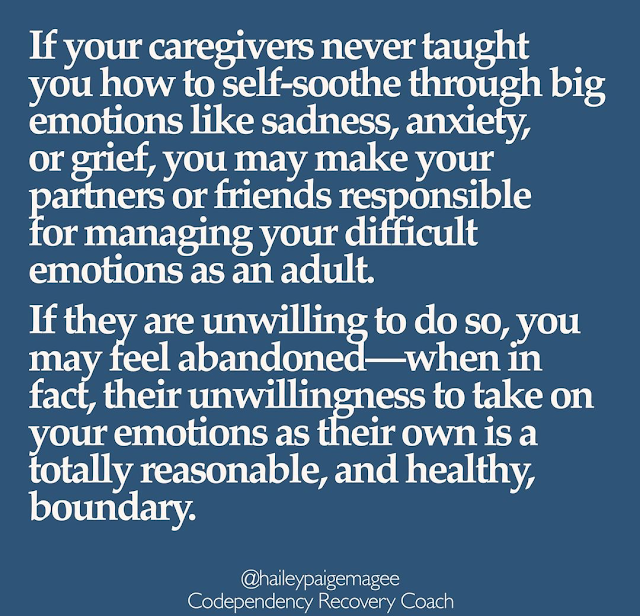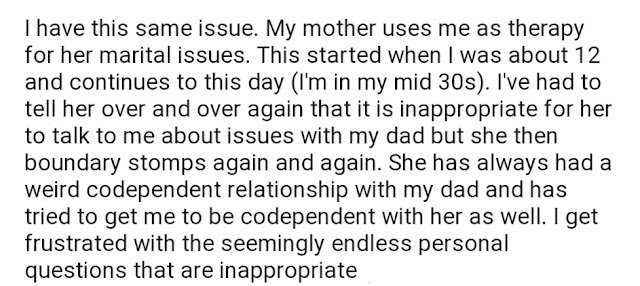Actually, it's not just kids.
No one—regardless of who they are—is responsible for our emotions.
It's an inside job.
The onus is on us.
We should not charge our kids with the task of taking care of our emotions (i.e. making us happy, feeding us attention, expecting them to always agree with us, etc.), nor should we attempt to shame or guilt them into thinking this is their job.
Doing so is not only irresponsible, it is also harmful: We are not only setting ourselves up for unhappiness and failure, we are damaging our kids.
This will likely backfire and create enormous friction in our relationships with them later on.
I'm about to show you what this looks like.
And it ain't pretty.
Online communities have long been a safe haven for teens, young adults, and especially older adults who seek guidance and support on this matter.
The following is a post from the discussion website Reddit. I have withheld the poster's screen name to protect her identity:
Here's another:
My friend Jamie has experienced a similar fate with her father.
The degree to which he is in a good mood around Jamie is contingent upon the degree to which she agrees with him or gives him what he wants.
"He doesn't like when I establish boundaries with him," Jamie explains. "Even if I communicate it nicely, it doesn't matter. I think he longs for the way our relationship used to be—back when I was younger. But I'm 46 now. We are both adults. I can hear the deflation in his voice the second I take a pass on his advice. I've felt guilty about this for a long, long time...even though I've done nothing wrong. But he has zero remorse for how he treats me whenever I say no."
Translation: Jamie realizes that she had been trained to care-take her father's emotions—and the fact that she's no longer willing to do so has put a tremendous strain on their relationship.
These kinds of occurrences are not all that uncommon.
And author Jane Isay—a mother of two adult sons herself—explores them in her book Walking on Eggshells: Navigating the Delicate Relationship Between Adult Children and Parents—in particular in the fourth chapter of the book entitled "Whose Life Is It, Anyway?":
"Being an adult means that you don't have to listen to your parents anymore. Grown children are exquisitely sensitive to this. Innocent comments from us can make them resentful and defensive. What we expect to be shrugged off with a "Yeah, Mom" is often taken as an assault. Who wants to be told what to do? We don't, and neither do our grown children.
The short version of my advice about advice is:
While I pretty much agree with Isay regarding unsolicited advice, there are most certainly times when an adult child finds his or her parent's advice helpful.
And will ask for it.
That's not the issue.
The issue as I see it is a parent's—or grandparent's—response when we don't want it.
It becomes a problem when any departure from how an elder did things is seen by them as disrespectful or a rejection of them as people.
It becomes a problem—as Jamie and the Reddit poster above explain—when an elder's happiness hinges on the erosion of an adult child's boundaries.
The parent or grandparent is basically placing their mood on their adult child or grandchild's lap and saying, Here, make this thing work for me. Make me feel good.
And that's simply too much to ask for.
Regardless of a child or grandchild's age.
Here are more Reddit confessions:
Here's another:
Though varied, these instances of emotional dumping all share the common thread of making someone else responsible for one's emotions.
But let's circle the wagons back to the beginning of this post, and, more specifically, the first Reddit confession.
What's going on there is especially tragic because it involves three generations who are affected by this behavior: Parents who emotion-dump on their kids become grandparents who emotion dump on their grandkids.
Although the first Reddit poster doesn't mention any details of the relationship between her mother and grandmother, she does disclose that her mother is an only child.
It's possible that the poster's mother grew tired of her mother's ways and refused to engage, which paved the way for the grandmother to make her granddaughter the new stand-in.
In an article entitled, "Nana vs. nana: Competition can be fierce among grandparents," which was originally published in
The Boston Globe and then later republished in
The Denver Post, licensed marriage, child, and family therapist Susan Stiffelman elaborates on this dynamic:
“To some degree grandparents are rewriting the story of raising their own kids. There’s this second chance – now I can really raise a kid who will love me. They are saying, ‘You can heal me from the painful relationship I had with your parents.' I also think there’s a loneliness when you are a grandparent.
“So you’re projecting on this kid a lot of hope to define your life as meaningful. Now you’ve got this kid whose job it is to make you feel important and loved, which is not a healthy thing to do.”
This.
A thousand times, this.
This has made me profoundly aware of how I express my emotions—especially anger and sadness—around my son and daughter.
I wouldn't say that I stifle my emotions.
But I do make a point not to divulge certain things in their presence because the mere act of doing so could be a burden on them—and ultimately make them feel responsible for fixing it.
I want my kids to accept that they are children.
Not emotional support animals. Not therapists. Not stand-in spouses.
They are not responsible for an adult's emotions—especially mine.
Of equal importance to me is the ability for my children to understand their uncomfortable emotions and grow to handle them on their own.
That capability is more precious than gold.
 |
| Hailey Magee, Codependency Recovery Coach Instagram: @haileypaigemagee |
ScaryMommy.com contributing writer Shannon Ashley once wrote:
"I have very strong opinions about people who expect too much from their children, and the idea that having a baby would make you happy or somehow exist just to enrich your life irked me to no end. Somehow, I guess I always knew that parenting had to be more about the kid and less about the parent. And much more about ending toxic family cycles."
Amen.
This is big, important work for us parents.
And so very necessary.
© Copyright Courtney Conover, 2022








No comments:
Post a Comment